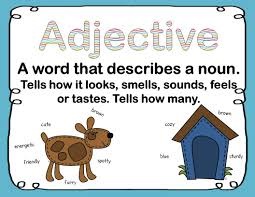|
|
| |
|
|
| |
|
|
|
|
| |
 |
| Description of an
adjective. |
Adjectives
An adjective is a word that describes a noun or pronoun.
Nouns are words that name a place, a person, a thing, or
an idea. An adjective is a word that gives more
information about the noun that goes with it. It is a
part of speech.
Examples |
- I like blue
skies and fluffy clouds.
- He is a nice
man.
- It was a very
cold day.
- My friend is very
tall with
brown eyes.
- They are good
people.
|
|
|
Often, the adjective is before the noun it describes.
Sometimes an adjective is not followed by a noun: |
- The sky is
blue.
- The joke she told was so
funny, I could not stop
laughing all day.
- It is still an adjective, because we
could have "the blue sky", "the funny joke", and "the
crazy man". The adjective is still describing the noun
though they are not side by side.
- There is a
tall man.
|
|
An adjective is a word that gives instant information about
a noun to make a clear picture of the noun in the mind of
the reader and create a feeling to the writer. |
|
Comparative and superlative
Sometimes there are different forms of the same
adjective. If one joke makes a person laugh more than
another joke, then that joke is funnier. This is called
the comparative form. The day that is colder than any
other is the coldest day. This is the superlative form
of "cold". Some adjectives need additional words when we
want to compare them. For instance, one car may be
cheaper than another, but the second car may be more
reliable (we use "more reliable", instead of "reliabler").
Reliable means worthy of trust.
The rule is:
For short adjectives ending in a consonant like "cold,"
"black," or "fast," one adds the suffix er to make a
comparison of greater magnitude. Example: "The North
Pole is colder than Florida." The greatest possible
comparison is made by adding the suffix est. Example:
"The North Pole is the coldest place on the Earth." For
long adjectives like intelligent, conscientious,
comprehensive, one uses the word more to make a
comparison of greater magnitude. Example: "Children are
more intelligent than adults."
A superlative makes the greatest possible comparison.
One uses the word most. Example: "She is the most
conscientious person I have ever known."
Nouns as noun modifiers
In the English language, it is possible for a noun to
modify (describe) another noun. Example: take the noun
"angel" and the noun "face." Put them together and the
result is "angel face." The first noun is acting as an
adjective, because it is giving us information about the
second noun. |
|
Adjectives and adverbs
Adjectives are words we use to describe the noun. Simple
words like "warm" and "fat" are adjectives commonly used
in writing. One can make adverbs from some adjectives by
adding the suffix ly. Example: take the adjective
"beautiful," the adverb is beautifully. One can do it
the other way around: take an adverb like "presumably,"
the adjective is "presumable". "Presumable innocence"
means the accused is assumed to be innocent until proven
guilty.
The adjective "guilty" becomes the adverb "guiltily" and
vice versa (the opposite), the adverb "guiltily" becomes
the adjective "guilty." |
|
|
 Kiddle: Adjectives Kiddle: Adjectives
Wikipedia: Adjectives |
|
|
|
|
|
|
|
|
|
|
|
|
|
|
|
|
Search Fun Easy English |
|
|
|
|
|
|
|
|
|
|
|
|
|
|
|
About
Contact
Copyright
Resources
Site Map |